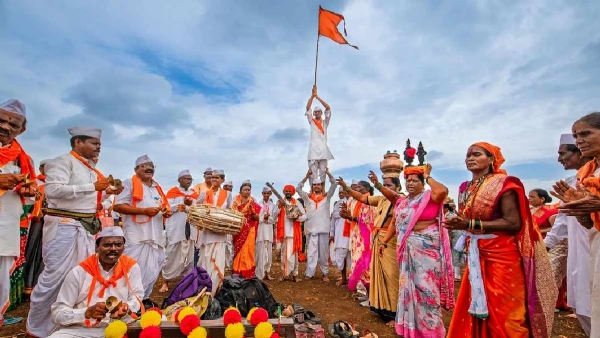‘Alla Deve’ and the False Secularization of the Ashadhi Wari
In 2022-23, the Abhanga "Alla Deve…" was widely circulated on social and mainstream media in a deliberate campaign to confuse the masses and insert secular overtones into a purely Hindu spiritual tradition.
Total Views |
The grand annual pilgrimage to Pandharpur renowned as the Ashadhi Wari, even though viewed as a religious procession, certainly signifies more than just that. It is an emotional, spiritual, and cultural expression of Hindu devotion. For centuries, it has served as a path of self-purification, collective surrender, and inner transformation largely for the Marathi-speaking Hindu community, along with others. However, in recent times, a disturbing trend has emerged, of misinterpreting and politicizing this profound spiritual tradition in the name of “secularism”.

Among the many distortions, one of the most glaring is the misuse of Sant Tukaram Maharaj’s Abhanga, “Alla Deve, Alla Dilave”. Sections of so-called secular intellectuals and left-leaning writers have attempted to appropriate this deeply spiritual poem as a representation of “Sarva Dharma Samabhav”, that basically propagates the egalitarian idea of all religions being equal. While the message of peace and coexistence is inherent in Indian spiritual traditions, this selective appropriation strips the Abhanga of its original context and intent.
The Real Meaning Behind "अल्ला देवे, अल्ला दिलावे"
It is historically accurate that Sant Tukaram composed some devotional verses in Hindi or Dakhani dialects, in which the word “अल्ला” appears. Scholars have even termed them as "Muslim Abhangas", though that label is simplistic and misleading.
Take this verse, for instance:
"अल्ला देवे, अल्ला दिलावे
अल्ला दारू, अल्ला खिलावे।
अल्ला बगर नहीं कोय
अल्ला करे सोहि होय ॥"
On the surface, this seems like an Islamic devotional poem. But a closer look reveals a fierce critique of alcoholism, cloaked in the everyday speech of the masses. Tukaram Maharaj was addressing an audience familiar with Islamic phrases and cultural expressions. He deliberately used common parlance to reach out to them, not to endorse Islamic theology, but to elevate them toward inner spiritual reform through Hari Bhakti.
"सब रसोंका किया मार
भजनगोली एक हि सार
इमान तो सब ही सखा
थोडी तो भी लेकर ज्या ॥"
Going on ahead in the same abhanga Sant Tukaram makes it more clear where the "drink" or "intoxication" becomes a metaphor for devotion, which is the ultimate high. Tukaram Maharaj asserts that true intoxication is found not in alcohol, but in the remembrance of the divine. The verses go on to warn against moral degeneration, the shame and regret awaiting the addicted in old age, and exhort the listener to embrace the joyous, sober, yet ecstatic path of Bhajan.
‘Wari’ Is Not a Platform for Political Narratives
The spiritual significance of Wari, rooted in the pre-Dnyaneshwar era, is being overshadowed by modern political agendas. In 2022-23, the Abhanga "Alla Deve…" was widely circulated on social and mainstream media in a deliberate campaign to confuse the masses and insert secular overtones into a purely Hindu spiritual tradition.
This was not a spontaneous act of inclusion, but a strategic distortion. Several self-styled 'neo-historians' have been accused of modifying or re-contextualizing Sant Tukaram’s verses to suit ideological narratives. Some even attempted to replace the traditional “ज्ञानबा-तुकाराम” chant with “नामदेव-तुकाराम” to inject caste politics into a historically caste-transcending movement.
Understanding the Bhakti Movement in Its True Spirit
The Bhakti Movement was indeed a reformative wave that arose partly in response to Islamic invasions and partly as an internal rejuvenation of the Hindu Dharma. While it rejected rigid rituals and caste hierarchies, it never negated Hindu philosophy. Saints like Tukaram, Dnyaneshwar, Namdev, and Eknath fought against injustice and inequality, not by abandoning their dharma, but by deepening its spiritual core. Understanding his particular fact is extremely significant in today’s times of ‘False Narratives’.
According to historian Ashirvadilal Shrivastav, the movement had two aims: (1) to strengthen Hinduism against external aggression, and (2) to promote social harmony by softening communal tensions. However, this harmony was never at the cost of diluting the Dharma. The Bhakti saints were not brand ambassadors of secularism; they were torchbearers of Dharmic reformation.
Who Gains From Turning Wari into a Secular Brand?
As with the politicization of festivals like Shiv Jayanti, certain interest groups have now set their sights on Wari. The idea is to project the Wari as a secular procession, diluting its Hindu roots to create a 'universal' appeal that fits into modern state narratives. But in doing so, they risk turning a sacred pilgrimage into a cultural commodity.
Even more troubling is the misuse of specific Abhangas, like “Alla Deve…”, to push this agenda. While it is true that some Muslim families have historically been part of the Wari, organizing horse processions or hosting Dindis, their participation was natural, not orchestrated, and certainly not used to redefine the tradition's essence.
Let Wari Remain What It Is: A Celebration of ‘Bhakti’
Sant Tukaram Maharaj's Abhangas, like the Wari itself, are born of a lived, organic tradition, rooted in deep devotion and spiritual discipline. Attempts to twist their meaning for ideological gains dishonor the very saints who gave their lives for Dharma.
"मेरी दारु जिन्हें खाया
दिदार दरगां सोहि पाया ॥"
The 'Daroo' here is not alcohol, but divine intoxication. Let us remember that.
Wari is not a brand!
It is the heartbeat of the Hindu soul, a joyous cry from the depths of Bhakti, walking steadily toward Bhagwan Vitthal and not toward a blurred, politicized version of “secular” harmony. Rather it is toward liberation through love.
Let it remain that way.
The referred sources can be found at Vayuveg
--


